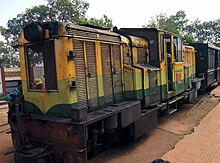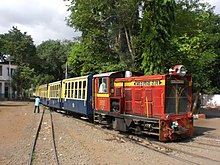Matheran Hill Railway
| Matheran Hill Railway | ||||||||||||||||||||||||||||||||||||||||||||||||||
|---|---|---|---|---|---|---|---|---|---|---|---|---|---|---|---|---|---|---|---|---|---|---|---|---|---|---|---|---|---|---|---|---|---|---|---|---|---|---|---|---|---|---|---|---|---|---|---|---|---|---|
 MHR train | ||||||||||||||||||||||||||||||||||||||||||||||||||
| Terminus | Matheran | |||||||||||||||||||||||||||||||||||||||||||||||||
| Commercial operations | ||||||||||||||||||||||||||||||||||||||||||||||||||
| Built by | Adamjee Peerbhoy | |||||||||||||||||||||||||||||||||||||||||||||||||
| Preserved operations | ||||||||||||||||||||||||||||||||||||||||||||||||||
| Operated by | Central Railways | |||||||||||||||||||||||||||||||||||||||||||||||||
| Length | 21 km | |||||||||||||||||||||||||||||||||||||||||||||||||
| Preserved gauge | 2 ft (610 mm) | |||||||||||||||||||||||||||||||||||||||||||||||||
| Commercial history | ||||||||||||||||||||||||||||||||||||||||||||||||||
| Opened | 1907 | |||||||||||||||||||||||||||||||||||||||||||||||||
| Preservation history | ||||||||||||||||||||||||||||||||||||||||||||||||||
| Headquarters | Neral | |||||||||||||||||||||||||||||||||||||||||||||||||
| ||||||||||||||||||||||||||||||||||||||||||||||||||
The Matheran Hill Railway (MHR) is a 2 ft (610 mm) narrow-gauge heritage railway in Maharashtra, India, which is administered by the Central Railway zone. It covers a distance of 21 km (13 mi), cutting a swathe through forest and connecting Neral to Matheran in the Western Ghats. The MHR is on the tentative list of UNESCO World Heritage Sites.[4]
History
[edit]The Neral–Matheran Light Railway was built between 1901 and 1907 by Abdul Hussein Adamjee Peerbhoy and financed by his father, Sir Adamjee Peerbhoy, at a cost of Rupees 16,00,000.[5] Adamjee Peerbhoy visited Matheran often, and wanted to build a railway to make it easier to get there. Hussain's plans for the Matheran Hill Railway were formulated in 1900, and construction began in 1904. The consulting engineer was Everard Calthrop. The line was open to traffic by 1907. Its tracks were originally 30 lb/yd (14.9 kg/m) rails, but were upgraded to 42 lb/yd (20.8 kg/m) rails. The ruling gradient is 1:20 (five percent), with tight curves, and speed is limited to 12 km/h (7.5 mph).
When the railway was opened, the rolling stock consisted of just two locomotives, fifteen First Class, two Third Class coaches, two luggage vans with postal accommodation, twelve open goods wagons, along with two saloons that were in verge of completion at GIPR's Parel Locomotive Workshops. One Locomotive was taken from the Darjeeling Himalayan Railway as well.
Around 1907, only one locomotive would run on the railway at a time. The service had two trains each way per day.[6]
The railway was closed because of flood damage in 2005 and was not expected to reopen before April 2007.[7] However, the first run on the repaired railway was on 5 March 2007.[8] The line observed its centenary on 15 April of that year. Service had been suspended during the monsoon season (from June to October)[9] because of the danger of landslides. During the 2012 monsoon season, Central Railway (CR) tested the railway's air brakes and, after approval from the Commission of Railway Safety, ran the train during the monsoon for the first time.[10] CR planned to shorten the monsoon service suspension to 15 July – 1 October.[11]
In November 2012, CR added a special coach (known as a saloon) to trains operating on the line. The saloons have sofas and LCD screens showing images from outside the train. The saloons had been available only to railway officers.[12][13]
Operator
[edit]The MHR and its assets, including the stations, line, and vehicles, belong to the Government of India and are entrusted to the Ministry of Railways. Central Railway handles day-to-day maintenance and management, and several programs, divisions, and departments of Indian Railways are responsible for repairs.
Rolling stock
[edit]Steam locomotives
[edit]
Consulting engineer Everard Calthrop designed the MLR Class 0-6-0Ts with Klien-Lindner axles to give a flexible wheelbase and four were supplied by Orenstein & Koppel. They ran from the railway's opening in 1907 until 1982, when they were replaced by diesel engines. By 1983, all steam locomotives were phased out. A B-class locomotive (#794) from the Darjeeling Himalayan Railway was transferred to the Neral–Matheran line in 2001 to test the feasibility of steam excursions.[4] It was sent to the Golden Rock workshops for conversion to oil firing in 2013, and returned to Neral soon afterwards.[14] Rail enthusiasts can once again enjoy and witness the 'steam-engine' on the Neral-Matheran toy train route. The steam engine will be fired either by electric power or hydrogen. Minister of Railways, Ashwini Vaishnaw informed that an electric and hydrogen propelled engine will be given the appearance of the old steam engine.[15]
Locomotive no. 738 is plinthed at the southern end of Neral Toy Train station, in a small garden. It was the engine in which Sir Abdul Hussein Adamjee Peerbhoy traveled, when he visited Germany to order the original four locomotives. (according to a plaque on the locomotive). No. 739 is preserved in the National Rail Museum, New Delhi, while No. 740 had been restored to full working order at South Tynedale Railway. No.741 is plinthed at Matheran Railway Station.
| MHR No. | Builder | Builder No. | From | Location |
|---|---|---|---|---|
| 738 | O & K | 1766 | 1905 | Neral |
| 739 | O & K | 2342 | 1907 | Delhi |
| 740 | O & K | 2343 | 1907 | Left South Tynedale Railway |
| 741 | O & K | 1767 | 1905 | Matheran |
| 794 | Baldwin | 44914 | 1917 | Neral |
-
Locomotive MLR-739
-
Locomotive MLR-740
-
Locomotive MLR-741
Diesel locomotives
[edit]


Because of the line's sharp curves, only short-wheelbase four-wheel diesel units can be used; Class NDM1 and NDM6 locomotives are in use. Class NDM1 has two powered units, articulated with a central cab and initially developed by German builder Arnold Jung Lokomotivfabrik. The non-articulated Class NDM6 was manufactured by the Bangalore builders SAN.
| ISR No. | Class | Builder | Builder No. | Date | Status | Notes |
|---|---|---|---|---|---|---|
| 400 | NDM-1 | Indian Railways, Parel Works, Mumbai | 2016 | Delivered from Parel January 2016 | In Neral shed awaiting commissioning, 1 April 2016 | |
| 500 | NDM-1 | Jung | 12108 | 1956 | Withdrawn | Originally No. 700 from Kalka-Shimla Railway |
| 501 | NDM-1 | Jung | 12109 | 1956; rebuilt at Parel 2002 | In service | Originally No. 750 |
| 502 | NDM-1 | Jung | 12110 | 1956 | Dismantled for repairs at Neral 1 April 2016 | Originally No. 751 |
| 503 | NDM-1 | Jung | 12111 | 1956 | Withdrawn | Originally No. 752 |
| 504 | NDM-1 | Jung | 12105 | 1956 | Withdrawn | Originally No. 701 from Kalka-Shimla Railway |
| 505 | NDM-1 | Jung | 12107 | 1956 | Withdrawn | Originally No. 703 from Kalka-Shimla Railway |
| 506 | NDM-1 | Jung | 12106 | 1956 | Withdrawn | Originally No. 702 from Kalka-Shimla Railway |
| 550 | NDM-1A | Indian Railways, Parel Works, Mumbai | 2006 | In service | On Aman Lodge shuttle 7/3/15 | |
| 551 | NDM-1A | Indian Railways, Parel Works, Mumbai | 2006 | In service | On Aman Lodge shuttle 7/3/15 | |
| 600 | NDM6 | SAN | 559 | 1997 | In service | Repairs at Neral 1 April 2016 |
| 603 | NDM6 | SAN | 568 | 1998 | In service | Recorded on 7 March 2015 on Aman Lodge shuttle |
Route
[edit]Neral, the starting point, is near Mumbai. The 2 ft (610 mm) narrow-gauge line runs parallel to the broad-gauge line west of Hardal Hill before turning east to ascend towards Matheran. The rail and road meet near Jumapatti, and meet again after a brief separation at Bhekra Khud. After a short level stretch, there is a sharp ascent just before Mount Barry. A large horseshoe embankment was built to avoid a reversing station here. The line runs for a mile or so northwards around this before turning to take the One-Kiss Tunnel through the embankment. Two more zig-zags through deep cuttings remain before Panorama Point is reached, and then the line bends back to Simpson's Tank and ends at Matheran. It takes about two hours and 20 minutes to complete the 21-kilometre (13 mi) journey, although CR plans to reduce this to one hour 30 minutes.
Stations
[edit]- Neral: The junction to switch lines.
- Jumapatti
- Water Pipe: Used for filling Steam Locomotives
- Aman Lodge: Named after a nearby Lodge
- Matheran: The Hill Terminus
-
Neral station
-
Jumapatti station
-
Water Pipe station
-
Aman Lodge Station
-
Matheran station
See also
[edit]References
[edit]Notes
[edit]- ^ Fernandes, Felix (1 May 2011). "Matheran toy train service disrupted". Mumbai Mirror. Retrieved 8 July 2013.
- ^ Verma, Kalpana (9 February 2009). "Toy train rams into tractor on Matheran-Neral route". Indian Express. Retrieved 8 July 2013.
- ^ Mehta, Manthan K (30 June 2013). "Central Railway to run shuttle service between Aman Lodge and Matheran in monsoon". The Times of India. Retrieved 8 July 2013.
- ^ a b "It's train, It's toy, It's beautiful commute". 2 October 2012. Retrieved 6 March 2016.
- ^ See inscription at Commons image.
- ^ Locomotive Magazine and Railway Carriage & Wagon Review. Locomotive Publishing Company. 1907.
- ^ Why you still can’t take the toy train to Matheran[dead link]
- ^ "Uphill Journey Resumes". 5 March 2007. Archived from the original on 25 May 2012. Retrieved 6 March 2016.
- ^ "Central Railway seeks fresh nod to run Matheran toy train in rains – The Times of India". The Times of India. 21 September 2012. Retrieved 6 March 2016.
- ^ "Matheran train ran in rains after 100 years | Latest News & Updates at Daily News & Analysis". dna. Retrieved 8 March 2016.
- ^ "Aman Lodge–Matheran Station toy trains start today – Indian Express". www.indianexpress.com. Retrieved 8 March 2016.
- ^ "CR makes uphill task enjoyable – Indian Express". www.indianexpress.com. Retrieved 8 March 2016.
- ^ "Cash-strapped Matheran toy train will operate till 9pm - Hindustan Times". Archived from the original on 6 October 2014. Retrieved 7 January 2014.
- ^ Verma, Kalpana (3 June 2013). "Steam locomotive set to return on Neral–Matheran route". The Indian EXPRESS. Retrieved 2 May 2016.
- ^ Mehta, Manthank. "'Steam engine' to chug up Maharashtra's Matheran hills again but won't be fired by coal | Mumbai News - Times of India". Times City. The Times of India. Retrieved 6 January 2023.
Bibliography
[edit]- Wallace, Richard (2021). "Chapter 6: The Matheran Light Railway". Hill Railways of the Indian Subcontinent. Ramsbury, Marlborough, UK: The Crowood Press. pp. 147–164. ISBN 9781785008085.
External links
[edit]- Locomotive Magazine and Railway Carriage & Wagon Review,Volume 13- 1907 See pg 48 for an article on Matheran Railway
- Railway and locomotive engineering See pg 383.
- Neral Matheran Light Railway – Photographs of 2005 monsoon damage
- International Working Steam
- Neral Matheran toy train’s track record
- Aerial photo of the train
- Matheran Train Started Again








